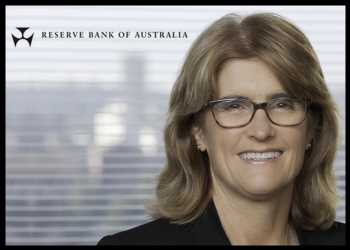
Australia Picks Michele Bullock As First Female RBA Governor
The Reserve Bank of Australia is set to have its first female governor in its 63-year history after Deputy Governor Michele Bullock was selected to replace the incumbent Philip Lowe whose term was not renewed, as widely expected, after the central bank came under severe public criticism for the interest rate hikes as well as for the drastic shortcomings in its forward guidance and communication in recent times.
Treasurer Jim Chalmers made the announcement of Bullock’s appointment on Friday. She is given a seven-year term that will commence on September 18.
Bullock will be the ninth governor of the RBA and the first woman to hold the post since the central bank was founded in 1960.
“Her appointment strikes the optimal balance between providing exceptional experience and expertise and offering a fresh leadership perspective,” Chalmers said.
“We are confident that Ms Bullock will provide the strong leadership and stability necessary for the RBA to navigate an increasingly complex and rapidly changing economic environment,” the treasurer added.
Bullock, who joined the central bank as an analyst in 1985, has held senior roles in various departments overseeing the financial system, business services, the currency and the payments system. She has been Deputy Governor since April 2022.
The central banker holds a masters degree in economics from the London School of Economics and graduated from the University of New England.
“I am deeply honored to have been appointed to this important position,” Bullock said.
“It is a challenging time to be coming into this role, but I will be supported by a strong executive team and boards. I am committed to ensuring that the Reserve Bank delivers on its policy and operational objectives for the benefit of the Australian people,” she said.
As RBA Governor, Bullock will oversee the implementation of the recommendations of the Review of the Reserve Bank of Australia, the Treasury said.
The RBA review that covered three decades of the central bank’s functioning was concluded in March and the panel presented the recommendations in April.
“The Treasurer has made a first-rate appointment,” RBA Governor Lowe said.
“The Reserve Bank is in very good hands as it deals with the current inflation challenge and implementing the recommendations of the Review of the RBA,” he added.
RBA Governor Lowe has a 43-year tenure at the RBA. He came to the helm of the bank in September 2016.
Lowe came under severe criticism for the shortcomings of the RBA policy guidance and communication.
His prediction in 2021 that interest rates will not rise until 2024 proved to be way off the mark after the RBA raised rates by a massive 400 basis points since May last year in the face of runaway inflation.
Last week, the RBA left the cash rate unchanged at 4.10 percent, its highest in 11 years, but Lowe signaled more tightening ahead.
Bullock appointment as RBA Governor is largely viewed as a move to ensure continuity.
“It remains to be seen whether the new Governor is more or less “hawkish” than Dr Lowe,” Westpac Chief Economist Bill Evans said.
Her comments in June suggest a convincing determination to achieve the inflation target by mid-2025, Evans added.
Westpac expects the RBA to raise the cash rate by 25 basis points at the upcoming August meeting and a further increase in the September meeting.
Bullock’s most recent speech on “achieving full employment” last month had advocated balancing the return to inflation target against labour market objectives, as Lowe has done from the first hike, J.P. Morgan Chief Economist Ben Jarman pointed out.
J.P. Morgan has forecast one more rate hike in August.
Capital Economics economist Marcel Thieliant doubts if Bullock’s appointment will have a major bearing on the outlook for interest rates. However, the firm changed it rate forecast and no longer expect the RBA to deliver a final 25 basis points hike to 4.85 percent in November.
The research firm now only expects two additional rate hikes in August and September, but sees the risk tilted towards even less tightening.
“We still expect the economy to enter a recession in the second half of the year and evidence of weaker growth should start to accumulate over the coming months,” Thieliant said.
The RBA Board expects the economy to expand as inflation returns to the 2-3 percent target range but the path to achieving this balance is a narrow one. The bank also said the outlook for household consumption continues to be the major source of uncertainty.
Source: Read Full Article